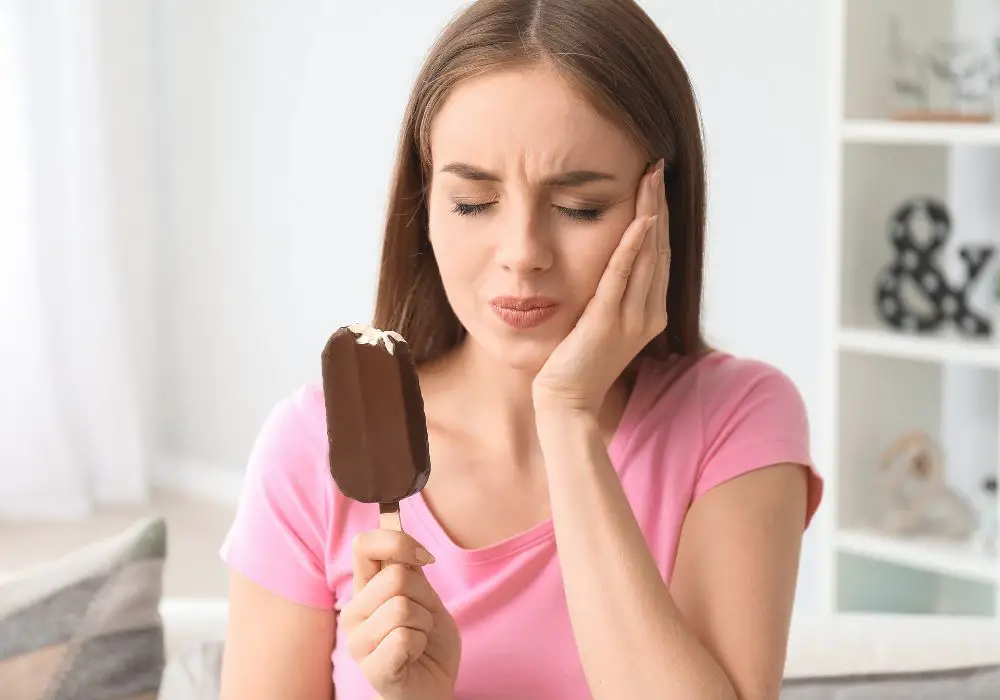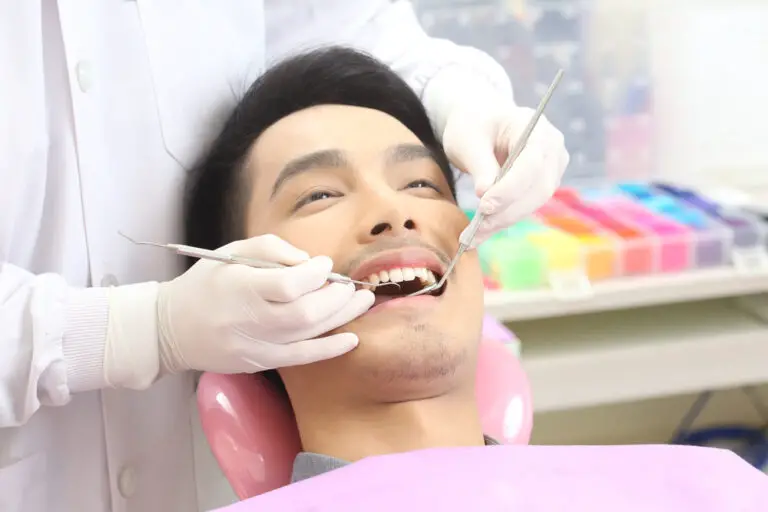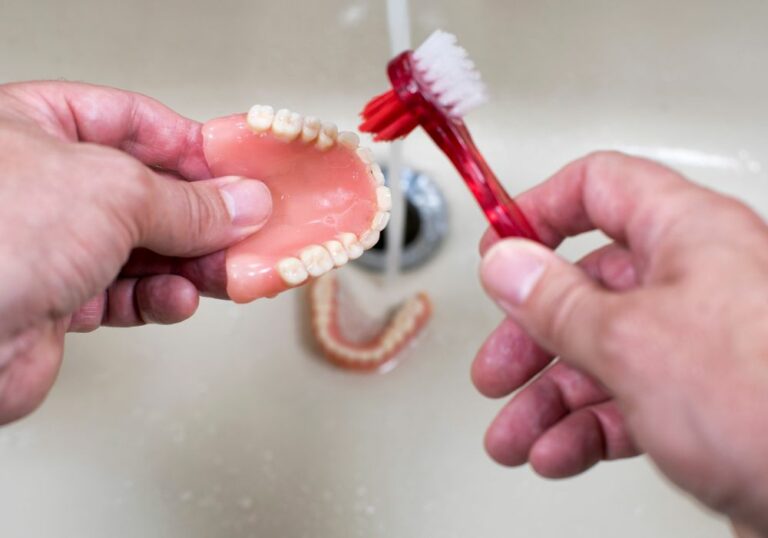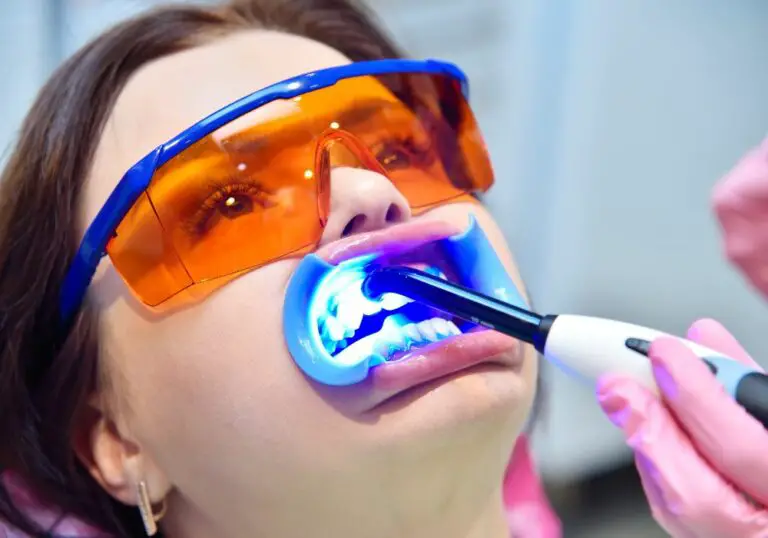What causes strange sensations in the bottom teeth?
There are several potential causes for strange or abnormal sensations in the bottom teeth:
Nerve irritation
One of the most common causes of odd dental sensations is irritation of the nerves supplying the lower teeth. The inferior alveolar nerve provides sensation to the lower teeth, and irritation of this nerve or its branches can result in symptoms. Sources of nerve irritation include:
- Tooth decay – Dental caries or cavities allow bacteria to penetrate the inner pulp chamber of the tooth, where the nerve endings lie. The inflammation of the nerve tissue inside the tooth (pulpitis) leads to pain and abnormal sensations. The sensations can feel electric, hot/cold, tingling, or itchy depending on the type of nerve fibers affected.
- Dental trauma – Injuries to the teeth from falls, accidents, or trauma often damage or expose the tooth pulp and nerves, leading to inflammation and strange sensations. The shock of the impact can also directly irritate the nerves. Symptoms may appear immediately or days later as inflammation develops.
- Cracked teeth – Cracks allow penetration of bacteria, cold air, and debris into the inner tooth layers. This irritates the nerves inside, causing odd feelings. Cracked tooth syndrome can cause intermittent sharp pains when chewing.
- Bruxism/teeth grinding – Chronic grinding or clenching puts excessive pressure on teeth, stressing the ligaments around tooth roots. This can inflame the nerves and cause sensations. It also leads to cracked teeth. The sensations are usually bilateral.
- Gum recession – When gums recede, it exposes more of the sensitive tooth root surfaces. Open dentinal tubules along the roots allow irritants to penetrate deeper, inflaming the inner nerves of teeth. This causes sensitivity and abnormal feelings.
- Defective dental work – Fillings, crowns, and other restorations that are leaking or allow seepage of bacteria can lead to inflammation and irritation of the underlying tooth nerves. New sensations can indicate deteriorating dental work.
Nerve damage
In some cases, the strange feelings are due to damage to the nerves supplying the lower teeth. Types of dental nerve injuries include:
- Root canal treatment – While root canals relieve pain, the procedure removes the nerve endings within the tooth. This can later cause numbness or tingling due to small nerve fibers being damaged.
- Tooth extraction – Removal of a tooth inevitably severs the nerve fibers around the roots. Some regeneration occurs but numbness or odd nerve sensations frequently persist long-term after extractions.
- Local anesthetic injections – The needle used to administer local anesthetic blocks can sometimes penetrate or injure tiny nerve fibers. This causes inflammation and prolonged numbness, tingling, or burning sensations.
- Mouth injuries – Sports collisions, fights, falls, or major accidents that injure the lower teeth, gums, or jawbone can directly damage the main nerves or tiny nerve endings supplying sensation. Neuropathic-type pain often follows.
Referred pain
Referred pain means pain is felt in a location away from the source. Dental issues in the upper teeth can sometimes refer pain to the lower teeth.
For example, pulpal inflammation or periapical abscesses in an upper molar can irritate the maxillary nerve. This nerve communicates with the mandibular nerve supplying the lower teeth. The shared nerve sensation pathway results in strange feelings being perceived in the lower teeth, even though the problem is actually in the upper tooth.
Neuralgia
Neuralgia refers to pain originating from nerves themselves rather than underlying tissue damage. Trigeminal neuralgia is a nerve pain condition sometimes called “tic douloureux”. It can cause brief but very intense sharp pains or electric shock sensations in the teeth or jaws. These flare up suddenly with no obvious cause.
Dental treatment complications
- Orthodontic treatment like braces can sometimes put pressure on teeth, inflaming nerves and causing temporary pain.
- Teeth whitening treatments rarely cause inflammation or irritation of the inner dental nerves and pulp. This usually resolves fully after treatment.
- Dental injections, drilling, prep work, or impressions during dental procedures can cause short-term nerve inflammation, resulting in post-procedure sensitivity. This usually resolves within a few days.
Neurological disorders
Diseases like multiple sclerosis, Parkinson’s, trigeminal neuralgia, shingles, seizures, or fibromyalgia can sometimes manifest with strange dental nerve pain or sensations. The trigeminal and other nerves supplying the mouth may be directly affected.
What does the strange sensation feel like?

People describe the odd or abnormal tooth sensations in different ways:
- Tingling, tickling, or prickling
- Numbness, deadness, or lack of sensation
- Burning, stinging, or itching
- Sharp, shooting, stabbing, or electric shock pains
- Feeling of coldness or aching deep inside the tooth
- Feeling pressure or fullness in the tooth
- Sensitivity to hot, cold, or sweet foods/drinks
Some report an intermittent pins and needles sensation, or say it feels like worms wiggling around inside the tooth. Others feel like a mild electric current is running through the tooth.
The intensity varies from mild tingling to severe pain. In some cases, the tooth is also extremely sensitive when eating or drinking hot/cold foods. Sudden sharp pains when biting down can indicate a cracked tooth.
Should I be concerned about strange sensations in my teeth?
Mild, fleeting sensations in the teeth are usually not concerning. But the following signs indicate a dental evaluation is needed:
- Ongoing sensations that persist steadily rather than intermittent twinges
- Significant or increasing intensity of discomfort, pain, or sensitivity
- Symptoms worsening noticeably over days or weeks
- Sensations combined with other symptoms like tooth pain, gum swelling, bad taste
- Neurological symptoms like face numbness or weakness
- Interference with sleeping, eating, or daily function
Sudden severe toothache, jaw swelling, or fever can signal a dental emergency like an abscess. Seek urgent dental care if you develop:
- Unbearable, spontaneous toothache
- Pus discharge
- Difficulty swallowing
- Difficulty opening mouth
- Tooth feels extremely loose or movable
While many causes of odd sensations are benign, some warrant treatment. Let your dentist assess it.
Diagnosing strange dental sensations

To determine the cause of abnormal tooth sensations, the dentist will:
- Take a full medical and dental history – This includes information about symptoms, timing, triggers, past dental work, and health conditions. Details about nerve sensations are noted.
- Ask questions to precisely characterize the sensation – This includes location, description, duration, triggers, intensity, and associated symptoms.
- Conduct a clinical exam of the teeth and gums – Teeth are inspected for cracks, decay, or problems. Gums are checked for recession, swelling, or abscess.
- Assess dental treatments like restorations, root canals, or orthodontics – Faulty dental work that could be irritating nerves will be identified.
- Check tooth mobility and percussion – Teeth are tapped to see if sensations radiate. Loose teeth may indicate infection.
- Take periodic temperature and sensitivity readings – This tests if hot/cold stimuli alter symptoms.
- Order dental x-rays – These visualize below the surface for decay, cracks, cysts, gum disease, or bone damage.
- Bite evaluation – Checks for malocclusion, uneven wear, or grinding patterns.
- Pulp vitality testing – This analyzes nerve responsiveness and health.
- Referral to specialists – Endodontists can test for cracked teeth or pulp vitality. Oral surgeons may order CT scans or MRIs.
How are abnormal tooth sensations treated?
Treatment targets the diagnosed cause and may include:
Treating dental causes
- Fillings, root canals, crowns, or extractions to treat decay or damaged teeth
- Gum surgery and grafting procedures for receding gums and root exposure
- Nightguards, neuromuscular therapy, and occlusal adjustment for teeth grinding
- Orthodontic treatment to correct bite issues
- Replacing defective dental work like leaky fillings or poor crowns
Medications
- Over-the-counter NSAIDs like ibuprofen to relieve pain and inflammation
- Muscle relaxants and anticonvulsants for trigeminal neuralgia nerve pain
- Tricyclic antidepressants to reduce neuropathic dental nerve pain
- Prescription analgesic mouth rinses to soothe nerve pain
Dental nerve treatments
- Endodontic root canal treatments for irreversible pulpitis
- Steroid pastes or rinses to reduce inflammation of dental nerves
- Local anesthetic nerve blocks to interrupt pain signals
- Low-level laser therapy applied to gums to stimulate healing
Surgery
- Dental extractions to remove infected or damaged teeth
- Draining of dental abscesses
- Tooth reimplantation or splinting if teeth were knocked loose or fractured
- Microsurgery procedures to repair injured mental nerves
- Tooth hemisection to remove cracked roots while saving teeth
In cases of neurological disorders, physicians would provide appropriate medications, physical therapy, or other interventions to help manage the condition.
Home remedies and prevention

You can help relieve symptoms and prevent recurrences by:
- Using OTC pain medication when sensations flare up
- Brushing and flossing gently twice daily
- A soft diet temporarily avoiding very hot/cold foods
- Cold compresses to relieve pain and swelling
- Warm saltwater rinses to soothe inflamed gums
- Stress reduction techniques if grinding habit
- Avoiding chewing pens, nails, ice, popcorn kernels, and other hard foods
- Using a nightguard if you clench or grind teeth
- Wearing a mouthguard during contact sports play
- Quitting tobacco, as smoking increases gum recession risk
See your dentist promptly if symptoms persist or worsen. Trying to wait out nerve pain can allow minor problems to progress. Early intervention improves outcomes.
When to see a doctor
Consult your dentist right away if you have:
- Unexplained tooth pain
- Persistent odd sensations
- Hot/cold sensitivity
- Loose teeth
- Swelling or tenderness of gums
- Fever, chills, or feeling ill
Seek emergency dental care for:
- Sudden, severe toothache
- Jaw swelling making it hard to swallow
- Numbness or weakness of the face
- Tooth injury from trauma
- Uncontrolled oral bleeding
- Difficulty breathing
See a physician promptly as well if you have neurological symptoms like face numbness or weakness along with the dental symptoms.
Can strange tooth sensations be prevented?

You can minimize your risk by:
- Brushing and flossing twice daily
- Using fluoride toothpaste
- Replacing worn toothbrushes every 3-4 months
- Seeing your dentist for exams and cleanings every 6 months
- Getting cavities filled before they enlarge
- Avoiding smoking and excessive alcohol use
Practicing excellent oral hygiene, eating a low-sugar diet, getting routine dental care, and using mouthguards for sports can help lower your risk of experiencing many common causes of abnormal tooth sensations. But some symptoms still can’t always be fully prevented. See your dentist right away if any odd feelings do occur. Early diagnosis and treatment lead to better outcomes.
Summary
- Strange sensations in the lower teeth have many possible causes, including dental issues like decay or cracked teeth, gum recession, nerve injuries, trigeminal neuralgia, referred pain from the upper arch, and complications from dental treatments.
- Symptoms are described as tingling, burning, numbness, sharp pains, sensitivity, or feeling like a mild electric current running through the tooth.
- While mild sensations may not need treatment, more concerning signs include constant symptoms, increasing intensity, interference with sleep or eating, fever, swelling, or neurological issues.
- Diagnosis involves a medical history, dental exam, x-rays, vitality testing, bite analysis, and sometimes advanced imaging like CT scans or MRIs.
- Treatment depends on the cause but may include dental procedures, medications, dental nerve treatments, physical therapy, or surgery in some cases.
- Prevention involves good oral hygiene, diet, regular dental exams, mouthguards, and avoiding chewing hard items.
- See a dentist promptly if any abnormal sensations develop to receive timely treatment.
Frequently Asked Questions
Q1: What does it mean if I have no actual tooth pain but a constant strange sensation?
Persistent odd sensations without overt pain often indicate some type of underlying nerve irritation or damage. Potential causes could include dental procedures over-irritating nerves, trigeminal neuralgia, cracked teeth, or chronic inflammation from gum disease involving nerves. It warrants an evaluation to determine the exact source and appropriate treatment.
Q2: Can sinus problems or congestion cause odd tooth sensations?
Yes, in some cases sinus infections, blockages, or inflammation can radiate pain or strange sensations to the upper back teeth. This is due to the nerves for the sinuses and upper teeth both passing through the maxillary sinus region. Successfully treating the sinus problem often resolves the referred dental symptoms.
Q3: Why do my tooth sensations seem to come and go?
Intermittent, fleeting sensations most often arise from temporary inflammation or irritation of the nerves supplying the teeth. Common triggers include temperature changes, sugary or acidic foods, brushing too hard, or mild trauma from chewing. The sensations go away once the irritation subsides. However, it’s still a good idea to discuss even intermittent symptoms with your dentist.
Q4: If I have severe tooth pain or swelling, should I go to an emergency room?
An emergency room can provide pain relief, antibiotics, and initial care for urgent dental issues like a suspected tooth abscess or infection. However, you’ll still need prompt follow-up assessment and treatment from a dentist to definitively resolve the underlying problem. When possible, seeing an emergency dentist first is generally preferable.
Q5: Is it true that teeth whitening treatments can sometimes cause strange sensations?
In rare cases, the chemicals used in bleaching or whitening treatments can temporarily inflame the inner dental nerves and pulp tissue. Resulting sensitivity or odd sensations generally resolve fully within a few days after treatment ends. But if any unusual feelings persist longer, do discuss it with your dentist.






